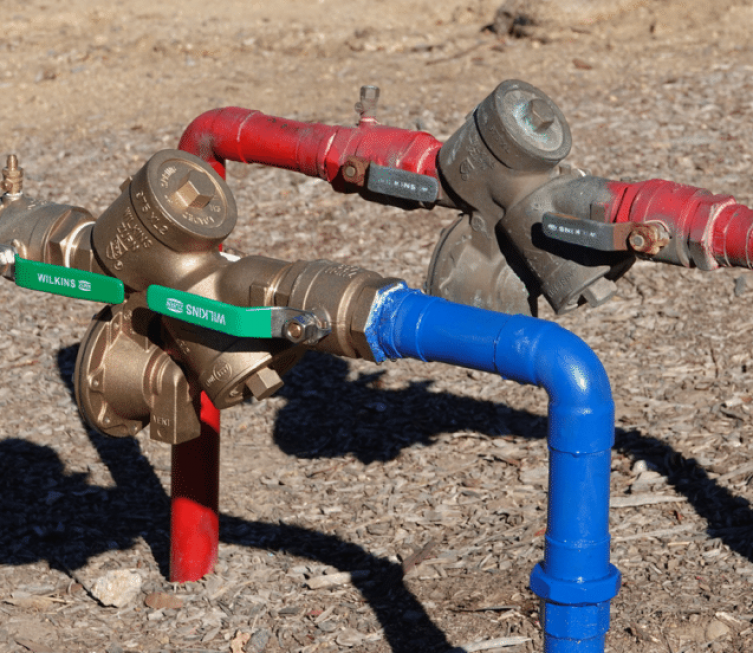
Clean water is essential to life. A big threat to our potable water supply is backflow. Knowing what it is will help you understand the importance of having your backflow devices tested annually. Hughes Plumbing Contractors are endorsed backflow testers operating throughout SEQ 24/7. If your annual test is due, please get in touch with our One Call We Do It All Team on 0406 288 142 or email info@hughespc.com.au.
What Is Backflow?
Put simply, backflow is when water flows in the opposite direction of that which it is supposed to. Another important term to understand is cross connections, which are a point where a mains water source meets other lines containing liquids that may not be potable. An example is where the public water system supplies potable water and a irrigation system. Cross connections represent a big risk for backflow. Where dirty liquids flow in a reverse direction through a cross connection, dangerous contamination of potable water supplies can occur. This can present serious health risks which may affect the safety people drinking public water. Therefore, having your backflow devices tested annually as required by Council regulations is essential to check they’re still in good working order. Hughes Plumbing Contractors are specialist backflow plumbers with many years of experience in performing these tests. If you’d like to get your annual Council backflow test sorted, please call us on 0406 288 142 or email info@hughespc.com.au now.
Two Kinds Of Backflow
In reality, two types of backflow could possibly occur – backpressure backflow and backsiphonage. These two are caused by separate problems however both situations lead possible contamination of our clean water.
1. Backpressure Backflow
Backpressure backflow occurs because of a change in pressure. If pressure pushing water backwards is higher than the supply pressure moving water upstream in lines, a backpressure issue can happen. Dirty water could then be forced backwards into the supply lines. A common reason for backpressure arising is where the volume of water being used is higher than the water supply such as through overuse or when water mains break.
2. Backsiphonage
Backsiphonage happens when negative pressure is created in a public or private water system such as when the water supply stops. The causes a vacuum that sucks water back through the supply lines, similar to using a drinking straw. Common trigger include when firefighters are using mains water or even toilets that are not installed correctly.
No matter what the specific reason for a backflow event, it’s essential that steps are taken to prevent it occurring in the first place. That’s why Councils throughout SEQ regulate the testing of backflow devices and require them to be conducted annually. Please contact Hughes Plumbing Contractors for your annually backflow testing services today anywhere in Brisbane, the Sunshine Coast or the Gold Coast.

What Is Backflow Prevention ?
Backflow prevention devices are essential to protect our potable water supplies. Some newer plumbing fixtures such as sink and shower taps may already have backflow prevention techniques integrated. However, in most cases using a backflow preventer is required which is commonly known as a backflow prevention device. These devices are mechanical part which are designed to stop backflow form occurring. Opposite to an air gap, backflow prevention devices often use a physical barrier to prevent the reverse flow of water as wll.
The professional commercial plumbers at Hughes Plumbing Contractors may use a variety of different backflow prevention devices at your property:
- Pressure Vacuum Breaker Assembly
- Reduced pressure Backflow Prevention Assembly
- Spill Resistant Pressure Vacuum Breaker Assembly
- Double Check Valve Assembly
Our expert backflow prevention plumbers can decide which type to install after we review situation. We also test all types, models and sizes of backflow prevention devices so you’re in safe hands.

Contact
Hughes Plumbing Contractors
As shown above, there’s a lot to understand about backflow and backflow prevention devices. That’s why there is Council legislation throughout Brisbane and SEQ that only endorsed professional backflow testers can work on these devices. With the importance of stopping the reverse flow of dirty water into our clean drinking water, it’s essential you meet the backflow testing obligations. By doing this, you’ll also avoid the steep fines Councils throughout SEQ issue for non-compliance. For a quick and affordable backflow testing service, please contact Hughes Plumbing Contractors on 0406 288 142 or email info@hughespc.com.au today!








